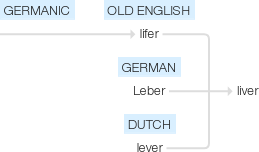Liver
Old English lifer, of Germanic origin; related to German Leber, Dutch lever .
wiktionary
From Middle English liver, from Old English lifer, from Proto-Germanic *librō, from Proto-Indo-European *leyp-(“to smear, smudge, stick”), from Proto-Indo-European *ley-(“to be slimy, be sticky, glide”). Cognate with Saterland Frisian Lieuwer(“liver”), West Frisian lever(“liver”), Dutch lever(“liver”), German Leber(“liver”), Danish, Norwegian and Swedish lever(“liver”) (the last three from Old Norse lifr(“liver”)). Related to live.
From Middle English livere, equivalent to live + -er.
live(adjective) + -(e)r.
etymonline
liver (n.1)
secreting organ of the body, Old English lifer, from Proto-Germanic *librn (source also of Old Norse lifr, Old Frisian livere, Middle Dutch levere, Dutch lever, Old High German lebara, German Leber "liver"), perhaps from PIE root *leip- "to stick, adhere," also used to form words for "fat."
Formerly believed to be the body's blood-producing organ; in medieval times it rivaled the heart as the supposed seat of love and passion. Hence lily-livered, a white (that is, bloodless) liver being supposed a sign of cowardice, Shakespeare's pigeon-livered, etc. Liver-spots, once thought to be caused by a dysfunction of the organ, is attested from 1730.
liver (n.2)
"one who lives (in a particular way)," late 14c., agent noun from live (v.).
